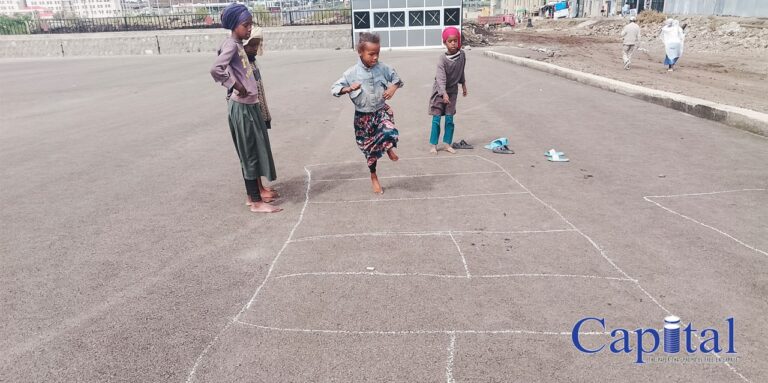Ethiopia’s Digital Banking Revolution and the Lesson from South Africa’s ATM Decline
I’ve had the privilege of writing many insightful articles on branding and business topics for The Weekly Capital, covering a range of subjects including ‘The Misconceptions About Branding,’ ‘The Basics of Successful Branding,’ ‘Why Brands Matter,’ ‘Can Anything Be Branded?,’ ‘How to Choose the Right Logo for Your Business,’ ‘Amplifying Brands: The Power of the Right Brand Ambassador,’ ‘The Hospitality Culture of Ethiopia and Its Potential for Business Success,’ and ‘The Power of Personal Branding in Driving Success,’ among others. This time, I’m shifting the focus to digital banking and ATM applications with an article titled ‘Ethiopia’s Digital Banking Revolution and South Africa’s ATM Decline
Ethiopia is undergoing a significant transformation in its banking sector, driven by the rapid adoption of mobile phones and the rise of digital payment solutions. With more than 80 million mobile users and over 52 million subscribers to Tele Birr, Ethiopia’s mobile money service, the country is well on its way to becoming a digital-first economy. The “Digital Ethiopia 2025” initiative has already shown positive results, and preparations are underway for the next phase, “Digital Ethiopia 2030.” This rapid shift toward digital banking offers Ethiopian Banks an excellent opportunity to reduce reliance on traditional banking infrastructure, particularly physical services like branch banking and ATMs.
South Africa’s ATM Decline: A Global Lesson for Ethiopia
To understand how Ethiopia can navigate this transition, it’s useful to examine recent changes in South Africa. The country’s banking industry is witnessing a marked reduction in the number of ATMs. Major banks such as Absa, FNB, Nedbank, and Standard Bank closed a combined total of 233 ATMs in the first half of 2024. While these closures reflect a global trend, Capitec Bank has taken a different approach by partnering with retail outlets to offer agency banking services for withdrawals and deposits. This demonstrates how banks can maintain service access without heavily relying on their own ATM networks.
The primary reason for this shift is the rise of mobile banking and digital payment systems. More South Africans are using smartphones to manage their finances, thus decreasing their dependence on ATMs. With mobile payments, digital wallets, and point-of-sale (POS) devices, customers can conduct transactions more easily and securely, making this a cost-effective solution for banks, as maintaining a large ATM network can be expensive. This information comes from The Guardian newspaper’s coverage of South Africa’s banking trends.
Lessons for Ethiopian Banks
In Ethiopia, banks are still heavily invested in deploying ATMs, especially in major cities. However, the trends observed in South Africa offer valuable lessons as Ethiopian banks move forward. The country’s increasing mobile penetration and the growing use of digital payment systems suggest that Ethiopian banks should reconsider their focus on ATMs, which are increasingly viewed as a hybrid solution—not fully digital.
While ATMs remain useful for cash withdrawals, they may hinder the transition to a fully digital banking system. In Ethiopia, ATMs are primarily used for withdrawing cash, which is becoming less necessary as digital solutions like mobile banking gain popularity. The demand for physical cash is dwindling, and digital payment tools such as QR codes, mobile wallets, and point-of-sale devices are already in use at many Ethiopian banks. These tools enable customers to make payments, transfer money, and manage their accounts using just a mobile phone. The growing adoption of services like Tele Birr clearly indicates that Ethiopians are ready for more digital banking options.
Strengthening Digital Banking
Banks in Ethiopia need to continue their efforts to strengthen digital banking services. While many banks already offer advanced services such as QR codes and mobile wallets, they should work on expanding these services to reach more customers, especially in rural areas. These tools are user-friendly and cost-effective, making them ideal for an increasingly digital society.
Mobile banking platforms should be further developed to ensure they are accessible, secure, and capable of offering a full range of banking services. The convenience of mobile-first banking means that more customers are likely to prefer digital solutions over traditional branch banking and ATM services. As mobile internet access improves and mobile phones become more affordable, the demand for physical banking infrastructure will continue to shrink.
Additionally, banks should focus on creating more seamless integrations with other services to build a comprehensive digital ecosystem. The widespread use of mobile wallets, integration of digital payment systems like QR codes, and collaborations with businesses to accept digital payments will ensure that customers can carry out all their financial transactions digitally, without needing to rely on cash or ATMs.
Reducing the Focus on ATMs
Significant number of Ethiopian banks are investing in importing and deploying ATMs in major cities and towns, which may not be the most cost-effective or sustainable long-term strategy. With the rise of mobile banking, the need for ATMs—especially those used mainly for cash withdrawal—is diminishing. While it is essential to have physical access points for customers who may still need to withdraw cash, Ethiopia’s banks should focus less on expanding ATM networks and more on developing digital solutions that cater to the evolving needs of the market.
One alternative to ATMs is agency banking, where banks can partner with local retailers to offer banking services such as cash deposits and withdrawals. This method could help banks reduce the high costs of maintaining a large ATM network while making banking services more accessible in rural areas where ATMs are often scarce. Agency banking has been successful in other countries and can play a key role in Ethiopia’s digital transformation.
Moreover, as Ethiopia’s digital financial ecosystem grows, the use of services like Tele Birr is expected to rise even further. This shift towards digital payments will naturally lead to a reduced reliance on cash, further decreasing the need for ATMs. Banks that focus on digital innovation and customer-centric mobile solutions will be better positioned to thrive in this new environment.
Encouraging a Cashless Society
Ethiopia is moving towards a digital-first economy, and the banking sector should continue to lead this transformation. Encouraging the widespread adoption of mobile payments and digital wallets will help reduce the dependency on physical cash and ATMs. The future of banking in Ethiopia lies in digital innovation—mobile banking platforms, digital wallets, QR code payments, and integration with other payment systems.
The more Ethiopia’s banks focus on digital solutions, the faster they can help create a truly cashless society. Through these efforts, Ethiopia can position itself as a leader in digital banking in Africa, providing a model for other countries to follow. By shifting focus from physical infrastructure like branch banking and ATMs to fully digital platforms, Ethiopian banks can provide better customer experiences, lower operational costs, and help the country’s economy move towards a more modern, efficient, and secure financial system.
We’d love to hear your thoughts on the article. Share your feedback with us via email at info@hayasebat.com or give us a call at +251 988 272 327.
Aschalew Tamiru is the founder and CEO of HayaSebat Marketing and Branding PLC. With extensive experience in senior management roles across various companies, he has made significant contributions to the industry. Aschalew is also a producer and host of popular business radio and TV shows. He is the author of two books: Make a Difference with Customer Service and Denbegna Yikidem (in Amharic). A certified Management Consultant, he is passionate about empowering businesses and individuals to achieve success.
Join hands to walk on the road of modernizationNew development in China, sharing opportunities with EthiopiaBy Chen Hai
Join hands to walk on the road of modernization
New development in China, sharing opportunities with Ethiopia
After the closing of the sessions of the National People’s Congress and the Chinese People’s Political Consultative Conference, General Secretary Xi Jinping visited Guizhou and Yunnan. In the ancient town of Lijiang, Yunnan, Xi Jinping walked along the stone road and had cordial exchanges with local residents and tourists along the way. “General Secretary, can I buy you a cup of coffee?” General Secretary Xi Jinping replied cordially: “Yunnan coffee is in a good position to represent China.”
Yunnan has fertile soil, abundant sunshine, and rich rainfall. The excellent geographical and climatic conditions make it a treasure land for the growth of small-grain coffee. Small-grain coffee has a unique flavor of “thick but not bitter, fragrant but not strong, and slightly acidic”. Today, Yunnan’s coffee planting area and output are both the highest in China.
When talking about coffee, one will naturally think of Ethiopia, the birthplace of coffee in the world. The aromatic Ethiopian coffee and the long-standing coffee ceremony have become a unique cultural landscape and an indispensable experience for tourists visiting Ethiopia. Coffee planting started relatively late in China, but it is one of the fastest growing countries in the world in terms of coffee consumption. Chinese consumers are willing to try high-quality coffee from different origins and with different flavors. Ethiopian coffee is increasingly favored by Chinese consumers, and prospects for China-Ethiopia coffee cooperation are broad.
General Secretary Xi Jinping also visited the Yunnan flower market and asked to focus on the entire industry chain and work hard from the seed industry, planting and market ends to make this beautiful industry a happy industry that benefits the people. Ethiopia is the second largest flower producer and major flower exporter in Africa, and has accumulated rich experience in flower planting, processing and export. China’s flower industry is large in scale, with sufficient consumption potential, and mature technologies such as preservation and cold chain. I believe that with the joint efforts of both sides, flower industry is expected to become a new growth point for China-Ethiopia cooperation.
Coffee and flower are just a microcosm of China-Ethiopia practical cooperation. During the last 55 years since the establishment of diplomatic relations between China and Ethiopia, especially in recent years, the two sides have continuously expanded the scope of cooperation, innovated cooperation model, and improved the quality of cooperation. In particular, the joint construction of the “Belt and Road” has achieved fruitful results, which helped promote Ethiopia’s industrialization and modernization process, and benefited the two countries and peoples. Last September, General Secretary Xi Jinping proposed the 10 major partnership actions for China and Africa to jointly promote modernization at the Beijing Summit of the Forum on China-Africa Cooperation, which charted the course for China-Ethiopia cooperation. Since December last year, China has granted zero tariff treatment to 100% of tariff items of products from all the least developed countries that have established diplomatic relations with China, including Ethiopia, in order to boost the development of African industries, promote job growth and poverty reduction. This demonstrates China’s responsibility as a major country and its determination to promote inclusive economic globalization. Since the implementation of this preferential policy a few months ago, the speed at which Ethiopian high-quality products enter China has accelerated. The Chinese side will work together with the Ethiopian side to encourage enterprises from both sides to make good use of policies and channels such as the China-Africa Economic and Trade Expo, the China International Import Expo and other large-scale exhibitions and the “green channel” for agricultural products to China, so that more and better Ethiopian products can enter the Chinese market and more Chinese people can share the fruits of Ethiopia’s development.
This year, China’s National “Two Sessions” proposed to develop new quality productivity according to local conditions and accelerate the construction of a modern industrial system. New quality productivity represents the future direction of scientific and technological development and is also the only way for China and Ethiopia to achieve modernization. China will focus more on large-scale application demonstration actions of new technologies, new products, and new scenarios, continue to promote “artificial intelligence +”, vigorously develop intelligent networked new energy vehicles, artificial intelligence mobile phones and intelligent robots, and expand the large-scale application of 5G communication technology. In fact, China and Ethiopia have successfully explored cooperation in developing new productivity. For example, the Telebirr electronic payment platform developed by Ethio Telecom with the participation of Chinese companies has been widely used in daily consumption in Ethiopia. It is also adding functions such as transportation, takeout, and short plays. In fact, it has become Ethiopia’s “Alipay” and e-commerce platform. Chinese new energy vehicles can be seen everywhere on the streets of Addis Ababa. Whether it is traditional industries or emerging industries, or the large number of Chinese factories active in Ethiopian industrial parks, they are all working hard to open up better prospects for China-Ethiopia cooperation.
In 2025, China will continue to contribute one-third of global economic development with a growth target of about 5%. Against the backdrop of increasing uncertainty in the global economy, China will stabilize the uncertain world with certainty, further expand opening up and international cooperation, continue to advance the Chinese-style modernization process, and form a higher level of benign interaction through domestic and international dual circulation. I firmly believe that a peaceful, stable, developing and prosperous China will bring new and greater opportunities for Ethiopia’s economic and social development. China is willing to follow the three initiatives proposed by General Secretary Xi Jinping, namely, the Initiative to Support African Industrialization, China’s Plan to Help African Agricultural Modernization, and the China-Africa Talent Training Cooperation Plan, to further implement the outcomes of the Beijing Summit of the Forum on China-Africa Cooperation and walk together on the road to modernization.
Chen Hai is Ambassador Extraordinary and Plenipotentiary of the People’s Republic of China to the Federal Democratic Republic of Ethiopia
After the closing of the sessions of the National People’s Congress and the Chinese People’s Political Consultative Conference, General Secretary Xi Jinping visited Guizhou and Yunnan. In the ancient town of Lijiang, Yunnan, Xi Jinping walked along the stone road and had cordial exchanges with local residents and tourists along the way. “General Secretary, can I buy you a cup of coffee?” General Secretary Xi Jinping replied cordially: “Yunnan coffee is in a good position to represent China.”
Yunnan has fertile soil, abundant sunshine, and rich rainfall. The excellent geographical and climatic conditions make it a treasure land for the growth of small-grain coffee. Small-grain coffee has a unique flavor of “thick but not bitter, fragrant but not strong, and slightly acidic”. Today, Yunnan’s coffee planting area and output are both the highest in China.
When talking about coffee, one will naturally think of Ethiopia, the birthplace of coffee in the world. The aromatic Ethiopian coffee and the long-standing coffee ceremony have become a unique cultural landscape and an indispensable experience for tourists visiting Ethiopia. Coffee planting started relatively late in China, but it is one of the fastest growing countries in the world in terms of coffee consumption. Chinese consumers are willing to try high-quality coffee from different origins and with different flavors. Ethiopian coffee is increasingly favored by Chinese consumers, and prospects for China-Ethiopia coffee cooperation are broad.
General Secretary Xi Jinping also visited the Yunnan flower market and asked to focus on the entire industry chain and work hard from the seed industry, planting and market ends to make this beautiful industry a happy industry that benefits the people. Ethiopia is the second largest flower producer and major flower exporter in Africa, and has accumulated rich experience in flower planting, processing and export. China’s flower industry is large in scale, with sufficient consumption potential, and mature technologies such as preservation and cold chain. I believe that with the joint efforts of both sides, flower industry is expected to become a new growth point for China-Ethiopia cooperation.
Coffee and flower are just a microcosm of China-Ethiopia practical cooperation. During the last 55 years since the establishment of diplomatic relations between China and Ethiopia, especially in recent years, the two sides have continuously expanded the scope of cooperation, innovated cooperation model, and improved the quality of cooperation. In particular, the joint construction of the “Belt and Road” has achieved fruitful results, which helped promote Ethiopia’s industrialization and modernization process, and benefited the two countries and peoples. Last September, General Secretary Xi Jinping proposed the 10 major partnership actions for China and Africa to jointly promote modernization at the Beijing Summit of the Forum on China-Africa Cooperation, which charted the course for China-Ethiopia cooperation. Since December last year, China has granted zero tariff treatment to 100% of tariff items of products from all the least developed countries that have established diplomatic relations with China, including Ethiopia, in order to boost the development of African industries, promote job growth and poverty reduction. This demonstrates China’s responsibility as a major country and its determination to promote inclusive economic globalization. Since the implementation of this preferential policy a few months ago, the speed at which Ethiopian high-quality products enter China has accelerated. The Chinese side will work together with the Ethiopian side to encourage enterprises from both sides to make good use of policies and channels such as the China-Africa Economic and Trade Expo, the China International Import Expo and other large-scale exhibitions and the “green channel” for agricultural products to China, so that more and better Ethiopian products can enter the Chinese market and more Chinese people can share the fruits of Ethiopia’s development.
This year, China’s National “Two Sessions” proposed to develop new quality productivity according to local conditions and accelerate the construction of a modern industrial system. New quality productivity represents the future direction of scientific and technological development and is also the only way for China and Ethiopia to achieve modernization. China will focus more on large-scale application demonstration actions of new technologies, new products, and new scenarios, continue to promote “artificial intelligence +”, vigorously develop intelligent networked new energy vehicles, artificial intelligence mobile phones and intelligent robots, and expand the large-scale application of 5G communication technology. In fact, China and Ethiopia have successfully explored cooperation in developing new productivity. For example, the Telebirr electronic payment platform developed by Ethio Telecom with the participation of Chinese companies has been widely used in daily consumption in Ethiopia. It is also adding functions such as transportation, takeout, and short plays. In fact, it has become Ethiopia’s “Alipay” and e-commerce platform. Chinese new energy vehicles can be seen everywhere on the streets of Addis Ababa. Whether it is traditional industries or emerging industries, or the large number of Chinese factories active in Ethiopian industrial parks, they are all working hard to open up better prospects for China-Ethiopia cooperation.
In 2025, China will continue to contribute one-third of global economic development with a growth target of about 5%. Against the backdrop of increasing uncertainty in the global economy, China will stabilize the uncertain world with certainty, further expand opening up and international cooperation, continue to advance the Chinese-style modernization process, and form a higher level of benign interaction through domestic and international dual circulation. I firmly believe that a peaceful, stable, developing and prosperous China will bring new and greater opportunities for Ethiopia’s economic and social development. China is willing to follow the three initiatives proposed by General Secretary Xi Jinping, namely, the Initiative to Support African Industrialization, China’s Plan to Help African Agricultural Modernization, and the China-Africa Talent Training Cooperation Plan, to further implement the outcomes of the Beijing Summit of the Forum on China-Africa Cooperation and walk together on the road to modernization.
Chen Hai is Ambassador Extraordinary and Plenipotentiary of the People’s Republic of China to the Federal Democratic Republic of Ethiopia
1. Name Etagegnehu Alemayehu
2. Education (School Level)
Bachelor’s Degree in Accounting and Finance
3. Company name (የመስሪያቤቱ ስም)
Etage Traditional Costumes
4. Title (የስራ ድርሻ)
Owner
5. Founded in (መቼ ተመሰረተ)
2020
6.What it does (ምንድነዉ የሚሰራው )
Selling traditional costumes made with modern designs
7. Headquarters (ዋና መስሪያቤት )
Adama
8. Start-up capital (በምን ያህል ገንዘብ ስራዉን ጀመርሽ/ክ)
100,000 birr
9. Current capital (የአሁን ካፒታል)
2 million birr
10. Number of employees (የሰራተኞች ቁጥር)
4
11. Reason for starting the business (ለስራው መጀመር ምክንያት)
To promote Ethiopian traditional clothing in a modern way
12. Biggest perk of ownership (የባለቤትነት ጥቅም)
Turning my own design idea into reality
13. Biggest Strength (ጥንካሬሽ/ህ)
Focusing on creativity and quality
14. Biggest Challenge (ተግዳሮት )
Obtaining quality raw materials
15. Plan (እቅድ)
To make the world aware of traditional Ethiopian Costumes
16. First career path (የመጀመሪያ ስራ)
Worker in tailoring
17. Most interested in meeting (ማግኘት የምትፈልገው/ጊዉ ሰዉ)
Eshetu Melesse
18. Most admired person (የምታደንቂዉ ሰዉ)
Myself
19. Stress reducer (ጭንቀትን የሚያቀልልህ/ሽ)
Listening to traditional music
20. favorite book ( የመፅሐፍ ምርጫ)
None
21. Favorite pastime (ማድረግ የሚያስተደስትህ/ሽ)
Spending time with my son
22. Favorite destination to travel to ( ከኢትዮጵያ ዉጪ መሄድ የምትፈልጊ/ገዉ ስፍራ)
Ireland
23. Favorite automobile (የመኪና ምርጫ)
None






